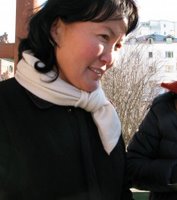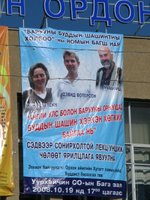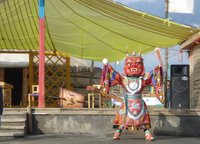Buddhism in Mongolia: FWBO meets Lamaism meets Christianity
 Following yesterday’s report on the new FWBO classes in Denmark, today we have news of another new Buddhist Centre linked to the FWBO, also started by a woman – this one in Mongolia!
Following yesterday’s report on the new FWBO classes in Denmark, today we have news of another new Buddhist Centre linked to the FWBO, also started by a woman – this one in Mongolia! The Centre is in Erdenet, some 300 kilometres from the capital city Ulaan Bataar, and was founded by a mitra, Oyuna Tgr, who still runs it. Oyuna contacted the FWBO via the West London Buddhist Centre.
Karunamaya, who recently visited en route to the biannual Sakyadhita International Buddhist women's conference (which happened to be held this year in Ulaan Bataar!), sends this report -
“Oyuna has done amazingly well to set up her small centre. When she returned from the UK, she bought a one-bedroom flat which she has converted and decorated into a Buddhist Centre, even down to the details of having dimmer switches for the lights.
“It costs something like 20 US dollars/month (I think) to keep the centre running. Often she pays this from her own money - my impression is that it's not always easy to fund oneself in Mongolia. Oyuna earns a living by tutoring students in Russian. But Russian is less in demand these days than English. So she has just started a one-year English course in Ulaan Bataar - this will cost her 500 US dollars for the year; it will also of course limit her ability to earn an income and to keep the Buddhist Centre going.
“She has nearly completed the Mongolian translation of “What is the Dharma?" by Sangharakshita, and hopes to publish it soon.
“Tarahridaya (an Indian Dhammacharini travelling with me to the Sakyadhita conference) and I visited Erdenet twice, both times staying with Oyuna and her daughter. The two of us, with Oyuna's support and translation, offered a regular twice-daily programme of meditation instruction and small dharma talks/discussion; also on the second visit we held a day retreat.
“At the time of our arrival, the Buddhist group had shrunk to a very few people attending. The enthusiasm and impetus generated by Shuddhabha's visit last year had decreased. My impression was that if I or others visited again a public talk might help generate interest. In fact I recommended this to Mahananda who was due to visit in September. (He subsequently did this)”
The story continues with Oyuna’s next visit, by Mahananda and his friends David and Joanna from the London Buddhist Centre.
David writes -
 “We arrived with our wonderful host Oyuna who looked after us so well despite study and work commitments. We were assured that the talk on 'Buddhism in England' which we had agreed to give at Oyuna's request would be a small affair - maybe ten people. However, as the taxi took us past the town hall we gaped in disbelief at a twenty-foot high poster outlining our rosy cheeks with names transcribed intoMongolian. Oyuna had left the local Gelugpa monastery in charge of publicity and they had ramped the affair up by hiring the Palace of Culture! The next day we were whisked to a TV studio for a half-hour live interview. We came on in-between re-runs of Nu Pagadzi - Joanna's favourite Soviet era cartoon! We ended up giving a talk in a University as well and Mahananda kept everyone amused leading some idiosyncratic stretching exercises and simple meditation”.
“We arrived with our wonderful host Oyuna who looked after us so well despite study and work commitments. We were assured that the talk on 'Buddhism in England' which we had agreed to give at Oyuna's request would be a small affair - maybe ten people. However, as the taxi took us past the town hall we gaped in disbelief at a twenty-foot high poster outlining our rosy cheeks with names transcribed intoMongolian. Oyuna had left the local Gelugpa monastery in charge of publicity and they had ramped the affair up by hiring the Palace of Culture! The next day we were whisked to a TV studio for a half-hour live interview. We came on in-between re-runs of Nu Pagadzi - Joanna's favourite Soviet era cartoon! We ended up giving a talk in a University as well and Mahananda kept everyone amused leading some idiosyncratic stretching exercises and simple meditation”. Karunamaya concludes –
 “There’s a long history of Mongolian society and Buddhism. In 1921 the Russians helped the Mongolians free the country from Chinese occupation. Around that time it became the Mongolian People's Republic. In the 1930s Stalin told the Mongolians that they had two masters, Buddhism and communism. He said that until they only had one master it would never truly be a Communist state. Subsequently, the Mongolians themselves destroyed Buddhism. Monasteries were ransacked, monks/nuns were disrobed, forced to marry or killed. Buddhism was very much equated with superstition. From what I can understand, there was some truth in this. The Buddhist monastic system did promote superstitious belief and was the source of some corruption and moral laxity.
“There’s a long history of Mongolian society and Buddhism. In 1921 the Russians helped the Mongolians free the country from Chinese occupation. Around that time it became the Mongolian People's Republic. In the 1930s Stalin told the Mongolians that they had two masters, Buddhism and communism. He said that until they only had one master it would never truly be a Communist state. Subsequently, the Mongolians themselves destroyed Buddhism. Monasteries were ransacked, monks/nuns were disrobed, forced to marry or killed. Buddhism was very much equated with superstition. From what I can understand, there was some truth in this. The Buddhist monastic system did promote superstitious belief and was the source of some corruption and moral laxity. “Currently, there is still some suspicion about Buddhism in areas that I mentioned above - eg, superstition, that it's incompatible with modern science, and allegations of immoral behaviour on the part of the monastics. Interestingly, on the Sakyadhita conference there was a talk entitled ‘Democratic changes and the conversion to Christianity’ by Narantuya Danzan, exploring a lot of the background and suggesting reasons why some modern Mongols have become Christians. It'll hopefully be published in a forthcoming book based on papers presented to the Sakyadhita conference.
“I wish to thank the FWBO Growth Fund and other donors for helping us with this trip.
Karunamaya
We are exploring the possibility of setting up a Translation Fund to help with the publication of basic Dharma materials in Mongolian – and of course other languages. Please contact FWBO News if you are interested.
Labels: Dharmaduta, Mongolia, women

 rss
rss